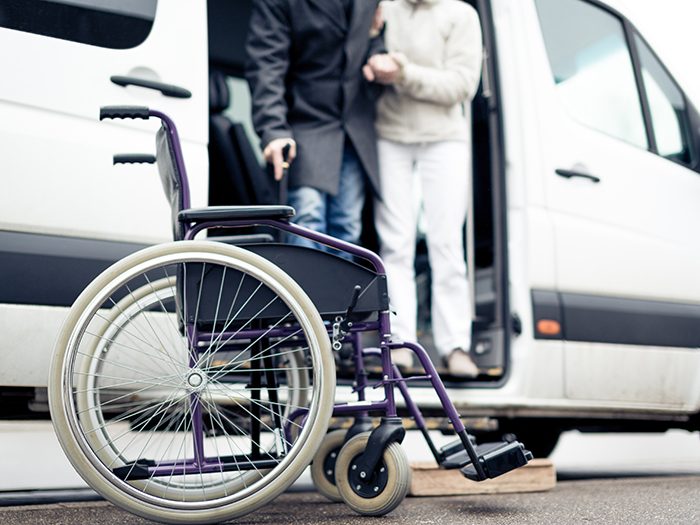Worker Injured While Traveling? How Workers’ Comp Should Respond

Picture this: You’re finally sending employees on their first work trips since the pandemic began.
For the first time in almost three years, they’re meeting clients in-person. Your employees are ready to relish in handshakes, fist bumps, days of face-to-face meetings and evenings of happy hours. They’re excited to explore the local food scene in a new city and make connections with new clients and colleagues.
The trip is off to a great start, until one worker trips over a piece of loose carpet on a flight of stairs. His arm lurches outward to break the fall, fracturing his wrist in the process. Now, he’s injured and he’s away from home.
“Statistically speaking, it’s not a common occurrence, but it does happen,” Tammy Bradly, senior director of clinical product marketing for Genex Services, said of workplace injuries that occur while an employee is away from home. “The more exposure you have, the more likely it could happen.”
How should workers’ comp respond in these cases? The answer: exactly like you would with any workplace injury, with compassion and determination that the worker’s wellbeing be put above all else.
When an employee is injured while away, there is an added dimension of difficulty to the claim, however. Workers’ comp case managers will have to work with the employee to decide whether they should be brought home or if they need to receive care where they are. Additionally, there may be language barriers or a need to transfer medical records if the worker is on an international trip.
When Might a Worker Be Hurt While Traveling?
Obviously, any normal vacation wouldn’t be eligible for workers’ compensation, but if a worker who is traveling for a conference or one who is temporarily on an assignment in another city or even country is hurt, then their injury may qualify.
Michelle Despres, vice president of product management and national clinical leader for physical therapy at One Call, knows first hand how difficult navigating a workplace injury while away from home can be. Earlier this year while attending the American Physical Therapy Association’s annual conference, she slipped, fell and fractured her leg.

Michelle Despres, vice president of physical therapy and national clinical leader, One Call
Her bone, she said, looked like a puzzle someone had dumped out of the box and onto a table. Fragments were everywhere.
The conference, which was held in San Antonio, Texas, was over a thousand miles away from her home in Jacksonville, Fla. Despres was away from her support system and her phone was dying as she was taken to the ER. She couldn’t help feeling alone and a little fearful.
“I was alone and in a place that’s not home,” Despres said. “I couldn’t call someone to just run over and give me a hand.”
Another scenario where workers’ compensation may have to step in and provide care for a worker who is in another country is when a worker who is a citizen of another country is employed by a U.S. company and working in the States.
Bradly shared stories of workers who, after experiencing permanent and total workplace injuries, wanted to move outside of the U.S. In one case a worker who needed home health care assistance decided to retire to Thailand with his wife. In another, a man whose injuries left him quadriplegic wanted to return to his home country, Costa Rica.
Both cases required Genex to navigate various challenges to providing care.
For the worker who wanted to retire to Thailand, Bradly explained that “home health care does not exist like it does in the U.S. in Thailand. Most often, if you need care, your family takes care of you.” So, Genex needed to figure out how to get him the services he needed. They ended up coordinating with a local hospital that could provide home care services.
The employee who wanted to return to Costa Rica faced similar challenges. He wanted to return to a remote town, where there were few health care resources in the immediate area. Genex found him a physician who was able to make house calls, so that his care wouldn’t be interrupted.
What Should You Do When a Worker Is Injured While Away?
The primary question workers’ comp professionals will face when a worker is injured while away: should they be treated where they are or brought back home for care?
The answer will vary based on the severity of the injury and the worker’s preference. In Despres’ case the answer was a hybrid of sorts. She had her first surgery in San Antonio before being transferred by air ambulance to Jacksonville for the rest of her care.
Though claims numbers aren’t generated instantly, it’s important for case managers to initiate contact early on when a worker is injured while traveling. Workers who are away from home may experience more anxiety and other psychosocial factors since they’re in an unfamiliar environment and may not be able to be in touch with their support system.
When possible, try to make the recovery process easy for the injured worker. One of the actions Despres appreciated most was when her case managers anticipated her needs. She remembers arriving home after her second surgery to find that her workers’ comp team had installed a ramp, so she could get through her front door while in a wheelchair. They also acquired a shower chair and other medical equipment she needed.
“They anticipated what equipment I was going to need and that was so helpful,” Despres said. “It was a stressor I didn’t realize I had until I knew they solved it.”
Injured Abroad? Get Ready for Even More Complexity
If a worker is injured abroad, managing care becomes even more complicated. Case managers may face language barriers, a need to transfer or translate medical records and other challenges in these instances.
Bradly said these hurdles may present themselves whether a worker is temporarily traveling abroad or if someone with a long-term, catastrophic injury later decides they want to move to another country.
“In both scenarios, we’re dealing with people who may be recovering outside of the U.S.,” Bradly said.
Genex’s Care Abroad program is designed to help employers navigate these labyrinthine situations. The program helps manage logistics like transferring medical records or providing translation services and providing support to injured workers.
“Arranging for all of those things to occur is a pretty heavy lift for a claims handler who is not accustomed to dealing with business outside of the U.S.,” Bradly said.
“Oftentimes, these injured employees can’t speak the language, so they may be in a hospital or meeting with a provider, but they can’t communicate with the provider. We can assist and support that injured employee, making sure they have appropriate access to translation services and really helping them to understand what’s going on.”
Whatever the case, employers should approach workers who were injured while on work-related travel with compassion.
Despres recalls how caring her coworkers and case managers were — packing up her hotel room for her, anticipating her needs, calling and sending cards to check in — throughout the recovery process.
“On the employer side, everyone was reaching out,” she recollects. “I received cards. I got flowers. I was connected to my work people.” &










